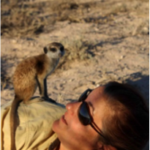 Principal Investigator: Professor Christine Drea, Ph.D.,
Principal Investigator: Professor Christine Drea, Ph.D.,
Mechanisms of female dominance and reproductive skew in a cooperative breeder
Cooperative breeding is of significant interest in evolutionary biology and the relevance of female-female competition to the operation of sexual selection is gaining appreciation; yet, the determinants of reproductive status (breeder vs. helper) in cooperative systems and the mechanisms underlying female aggression remain poorly understood. From evidence of reproductive suppression, eviction, and infanticide, it is clear that social dominance plays a key role in female competition. What remains unclear, however, are the factors that influence which females become dominant. Our team examines the proximal endocrine, social, and olfactory mechanisms that contribute to rank acquisition and reproductive skew in the cooperatively breeding meerkat. Using an integrated approach that combines hormonal, morphological, behavioral, and chemical analyses, we chart the developmental trajectory of female meerkats from conception to post dispersal, spanning three life stages (the fetal period, juvenility, and adulthood). We examine the factors that are normally associated with acquisition and expression of female dominance and test if female ‘masculinization’ through prenatal androgen exposure influences those factors. Integrating the information obtained across measures, life stages, treatment groups, and long-term ecological data provides valuable insight into the development, maintenance, and signaling mechanisms of social and reproductive inequity to potentially reveal a novel mechanism in the evolution of cooperation and female reproductive skew.
- Website: https://evolutionaryanthropology.duke.edu/people/christine-m-drea;
- Contact: cdrea@duke.edu
More information about current projects can be found by clicking on the group members’ names below.
 Website: http://kendrasmyth.weebly.com/
Website: http://kendrasmyth.weebly.com/
Contact: kendrasmyth@gmail.com
Eco-immunology in wild meerkats
As an immunologist turned ecologist or, more concisely, an ecoimmunologist, I am interested in understanding the proximate social and endocrine mechanisms underlying individual variation in immune function, as well as the fitness consequences of this variation. Meerkats are an interesting model for such work, because females are hormonally masculinized and androgens mediate female, but not male, dominance (see research from Drea Lab at Duke University). Importantly, androgens have been linked to immunosuppression in males of many species; yet, we know little about the consequences of androgens for female health. Through my research at the KMP, I have found that 1) dominant meerkats, especially females, are the most heavily parasitized group members, 2) dominant females have the weakest constitutive immune responses, and 3) female immunocompetence is negatively correlated with androgen concentrations. Like in males of typical species, in these ‘masculinized’ females, androgens appear to mediate a trade off between reproduction and health. Moreover, this trade off could be ‘inherited’ by a female’s offspring via differential prenatal exposure to androgens; thus, I am charting the health and survival of offspring derived from dominant dams, subordinate dams, and dominant dams that received an androgen-receptor blocker during gestation.

